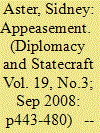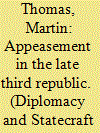|
|
|
Sort Order |
|
|
|
Items / Page
|
|
|
|
|
|
|
| Srl | Item |
| 1 |
ID:
083681


|
|
|
|
|
| Publication |
2008.
|
| Summary/Abstract |
Few of the enduring 'lessons of history' have had greater staying power than the legacy of appeasement. Decision-makers have used the crises of the 1930s to eschew and condemn appeasement. However, historians have not been so single minded in their analyses or applications. An historiographical survey of 'appeasement studies' then posits that a linear projection from orthodoxy, to revisionism, to counter- or post-revisionism' is not accurate. As to why recourse to the appeasement analogy is so prevalent is linked to the engagement, or lack thereof, between historians and public history and the decision-making process
|
|
|
|
|
|
|
|
|
|
|
|
|
|
|
|
| 2 |
ID:
083684


|
|
|
|
|
| Publication |
2008.
|
| Summary/Abstract |
This article considers whether a specifically French 'appeasement' developed among policymakers of the inter-war years and, if so, how various appeasement strategies changed over time. It does so firstly, by attempting to define this French version of appeasement partly by reference to the historiography of French inter-war foreign policy and strategic planning. The article then considers the various impersonal forces that led to changes of course in foreign policy. These include domestic social and political pressures, economic conditions, and the changing strategic balance of power in Europe. The article suggests that French appeasement was neither a constant feature of France's international strategy in the 1930s nor simply a mirror image of its British counterpart. The foundations of French diplomacy, military thinking and strategic outlook were altogether different. By the late 1930s the limitations of actual allies, the recalcitrance of some potential friends, the elusiveness of others, had all provided a powerful fillip to proponents of appeasement, although substantial minorities continued to oppose it. Ultimately, France without a great power ally was a nation compelled to appease
|
|
|
|
|
|
|
|
|
|
|
|
|
|
|
|
| 3 |
ID:
083680


|
|
|
|
|
| Publication |
2008.
|
| Summary/Abstract |
British grand strategy in the 1930s had two cardinal elements: security of the home islands and Imperial Defence. This article questions the view that Britain did not have a strategic commitment to the continent of Europe till late in the 1930s. It also provides an over-arching analysis of the two distinct but intertwined periods in the evolution of national strategy and Imperial defence in that decade: before 1930 till late 1937 built around the strategy of the balance of power; and from late-1937 till early 1939 built around the strategy of appeasement. Moreover, it is impossible to understand the high level debate within the British government over strategic issues without putting the domestic political situation into the context of the impact of the First World War on Britain's society and economy. Similarly, the development of the new international order created at the Paris Peace Conference - and its demise in the 'hinge years' of the early 1930s - also needs to be better understood in terms of how British grand strategy emerged in this period. A rational and realistic policy, appeasement was a tactical diplomatic manoeuvre; it had no place serving as the strategic basis of British external policy.
|
|
|
|
|
|
|
|
|
|
|
|
|
|
|
|
| 4 |
ID:
083683


|
|
|
|
|
| Publication |
2008.
|
| Summary/Abstract |
This article assesses British intelligence and its effect on policy during the interwar years. It discusses the publically available documentation, which now includes almost all the material on the matter, though the data base has been permanently destroyed in significant ways. The paper traces the development of British intelligence between 1869-1939, involving the transition from a tradition to a system of intelligence, with the greatest change occurring during the Fist World War. The article assesses how, between 1914-39, intelligence was interrelated to bureaucratic politics, modes of decision making, and the formulation of strategic politics, modes of decision making, and the formulation of strategic policy. It discusses the structure and power of British intelligence agencies between 1919-39, their quality compared to rivals in other countries, and the impact on policy of their successes and failures. It concludes that intelligence, as an influence and a source of evidence, is essential to the study of diplomatic and strategic history, upon which its impact is complex and variable
|
|
|
|
|
|
|
|
|
|
|
|
|
|
|
|
| 5 |
ID:
083682


|
|
|
|
|
| Publication |
2008.
|
| Summary/Abstract |
The British government's appeasement of fascism in the 1930s derived not only from economic, political, and strategic constraints, but also from the personal ideologies of the policy makers. Widespread guilt about the terms of the Versailles Treaty and tensions with France created sympathy for German revisionism, but the Cabinet properly recognized that Nazi Germany represented the gravest threat to peace in the 1930s. Fear of war and the recognition that Britain would have to tolerate peaceful change underlay attempts to appease the dictators, culminating in the Munich agreement in September 1938. After Munich, continued German belligerence, the Kristallnacht, and British intelligence assessments indicating that Hitler was prepared to attack the Western powers led to a reassessment of appeasement. The British government gave security guarantees to several European countries, seeking to deter future aggression and to lay the groundwork for a successful war against Germany should it prove necessary. While most of the British elite detested communism, anti-communist views did not govern British policy; security considerations required Soviet support in Eastern Europe, and Britain and France made a determined effort to secure Soviet support for the Peace Front
|
|
|
|
|
|
|
|
|
|
|
|
|
|
|
|
|
|
|
|
|